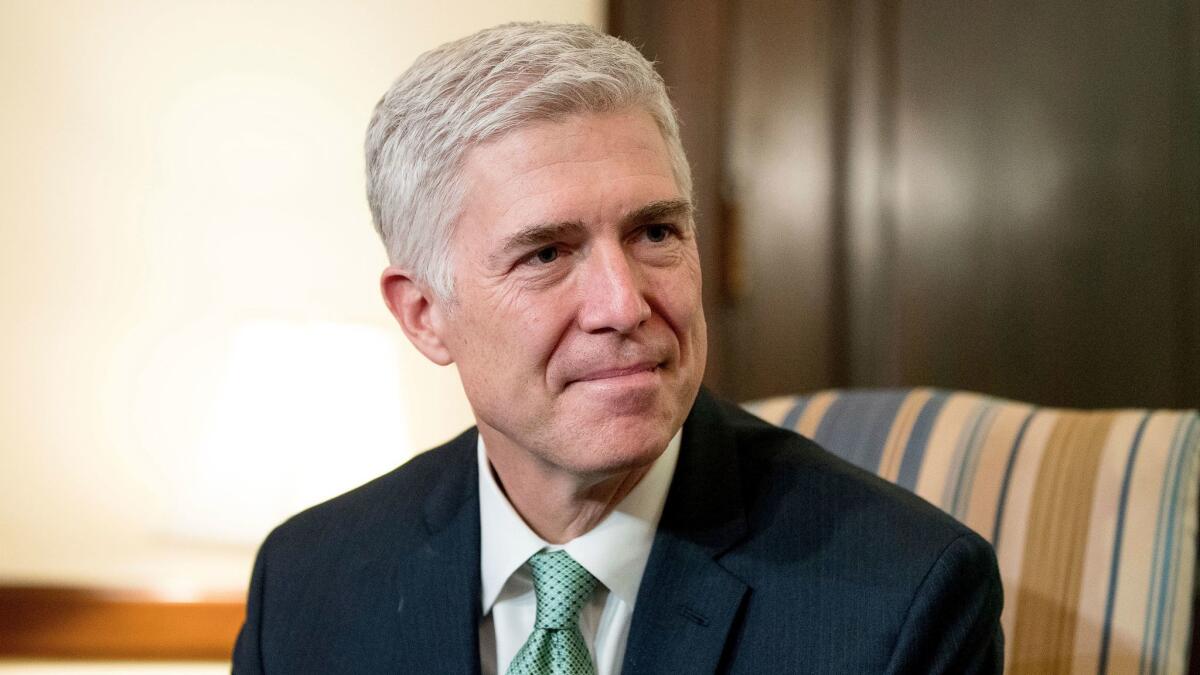Op-Ed: Make Neil Gorsuch actually answer questions in his Supreme Court confirmation hearings

- Share via
The Senate will begin its confirmation hearings for President Trump’s nominee to the Supreme Court, Neil Gorsuch, on March 20. If past is prologue, the hearings will tell us little to nothing about what Gorsuch actually thinks about today’s pressing legal issues.
Two decades ago, one of America’s leading jurists wrote a scathing indictment of the confirmation process in one of our country’s most elite law reviews. She called the hearings a “vapid and hollow charade” with “little educative function, except perhaps to reinforce lessons of cynicism that citizens often glean from government.” Her major complaint was that the confirmation process offered little substance on the nominees’ views, with senators unwilling to both ask tough questions and demand complete and honest answers. The author of that critique was Elena Kagan, now a Supreme Court justice herself.
Despite her critique, when Kagan appeared before the Senate Judiciary Committee, she was no more forthcoming than other Supreme Court nominees. She refused, as they all do, to talk about her views on past cases if there was even the remotest chance that a similar case could come before the court. For example, there was this exchange with Sen. John Cornyn (R-Texas) about District of Columbia vs. Heller, the 2008 Supreme Court decision that interpreted the 2nd Amendment as protecting a private citizen’s right to own guns:
Cornyn: “Let me just ask you, do you believe that the 2nd Amendment guarantees a fundamental individual right to keep and bear arms for law-abiding Americans?”
Kagan: “Sen. Cornyn, I think that Heller is settled law, and Heller has decided that the 2nd Amendment confers such an individual right to keep and bear arms.”
Some senators might actually prefer evasive answers, so that they don’t have to answer to their constituents for truthful responses.
Saying that the Heller decision is “settled law” is, of course, not the same thing as saying whether one agrees with the decision. Although no nominee to our highest court should pledge to decide any issue in a specific way, a nominee ought to be pressed to fully explain her views on cases that have already been decided and other current legal issues.
If Cornyn really wanted to know where Kagan stood on the 2nd Amendment, he should have insisted that she say whether she agreed with the Heller decision, disagreed with it, or wasn’t sure, either because she hadn’t thought about it or was genuinely uncertain.
The purpose of Supreme Court confirmation hearings is for the Senate to give its “advice and consent” on the suitability of a nominated judge. But the hearings can’t serve that purpose unless there is a real exchange with the members of the Judiciary Committee. As Kagan observed, when the Senate “ceases to engage nominees in meaningful discussion of legal issues, the confirmation process takes on an air of vacuity and farce, and the Senate becomes incapable of either properly evaluating nominees or appropriately educating the public.”
A nominee’s forthright responses could come with a disclaimer that the facts or legal context of a case could change her views on the law. After all, many nominees, including Gorsuch, have expressed their views on legal questions in articles and books long before stepping into the Senate Judiciary chamber room. As Sen. Chuck Schumer (D-N.Y.) once said: “Why this room should be some kind of a cone of silence is beyond me. The door outside this room does not say, ‘Check your views at the door.’”
Ever since the Senate refused to put Judge Robert Bork on the court in 1987, there has been an assumption that honest responses would torpedo a nominee’s confirmation. But this is not the correct lesson to take from that failed nomination. As law professors Lori Ringhand and Paul Collins established in their seminal book on the confirmation process, the Senate rejected Bork because his views on privacy, speech and gender discrimination were not shared by the vast majority of Americans. It is unlikely Gorsuch’s views are similarly out-of-touch, but we will never know unless the senators act like grown-ups and demand that he reveal them.
As Ringhand, Collins and even Kagan have argued, the hearings can serve the vital function of educating the public about controversial legal issues and demonstrating which constitutional doctrines are beyond dispute. No nominee who said that Brown vs. Board of Education was wrongly decided would be confirmed today, nor, sadly, to some of us, would a nominee who said this of Heller.
But senators should not be content with boilerplate responses that this case or that doctrine is the law of the land — the answer usually given when nominees are asked about prior cases and real issues — when they are responsible for deciding whether someone deserves a lifetime appointment to our highest court. Although some senators might actually prefer evasive answers, so that they don’t have to answer to their constituents for truthful responses, we should demand a more rigorous process.
Judge Gorsuch has had a long and distinguished legal career inside and outside of Washington. There is no doubt that he has given serious consideration to issues such as abortion, affirmative action and executive power. He should not promise how he would decide future cases, but he should be required to disclose his real views on these and other controversial constitutional questions. The American people have a right to know.
Eric J. Segall, a law professor at Georgia State University, is the author of “Supreme Myths: Why the Supreme Court Is Not a Court and Its Justices Are Not Judges.”
Follow the Opinion section on Twitter @latimesopinion or Facebook.
More to Read
A cure for the common opinion
Get thought-provoking perspectives with our weekly newsletter.
You may occasionally receive promotional content from the Los Angeles Times.









